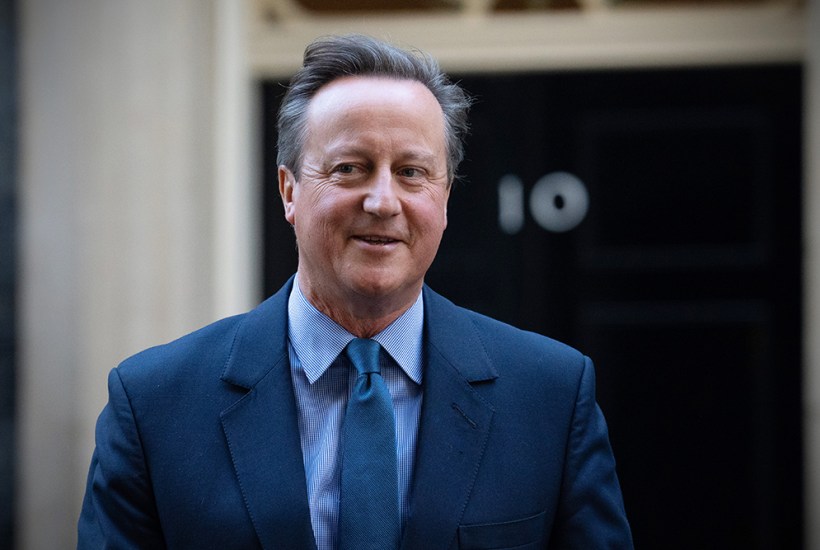It’s a week for improbable comebacks. The Beatles are back at number one, Chelsea are scoring goals again and David Cameron is in Downing Street. The return of my friend to the front line is a Rishi Sunak relaunch that I can warmly welcome. There is a lot of goodwill out there just waiting for our current Prime Minister to find his groove. Now he’s given up trying to appease the unappeasable nationalist right, or claiming to be better than all that’s gone before, he has a decent chance of being listened to. Not every occupant of No. 10 would have had the courage to appoint a predecessor – the last three have all suffered from tall poppy syndrome. Bravo to Sunak for having the imagination to appoint the best Foreign Secretary available to the country at a time of international crisis. The rift with the Cameroons has been healed. At least for now.
Perhaps now people will stop asking me, usually in a soft voice and with a tilted head: how’s David doing? They make it sound as if he has some terrible disease, when what they mean is how’s he coping with post-Downing Street life. I used to reply: ‘He’s fine, thanks. He was PM for six years, he has a lovely family and he’s earning loads of money. You don’t have to worry about him.’ Now I can add that he’s pulled off a spectacular comeback, is once again at the heart of global affairs and has the best-decorated office in Britain. So the answer is: David is doing just fine. And the only person who needs to worry is his bank manager.
If someone had told me ten years ago that the first person I’d want to call with news about Cameron was Ed Balls, I’d have asked what planet they were on. The answer is Planet Podcast. We decide we must record the first ever emergency episode of Political Currency – our weekly show. The logistics aren’t easy. I’m at a conference in Hong Kong. I scurry to my hotel room, perch my laptop on top of my suitcase on top of the bed, balance an LED light and microphone next to it, and off we go. ‘How long have you known?’ asks Ed. ‘I had an inkling,’ I reply. I can see the look of betrayal in his eyes. My new partner doesn’t want to know I’ve been consorting with the old one.
I got a sharp reminder of the problems our new Foreign Secretary must deal with on a Zoom call this week with an Israeli tech friend of mine. Normally he appears on my screen from his office, soft-spoken and wearing a business suit. This time he pops up wearing combat fatigues and standing next to an armoured car. I sign off by telling him to ‘stay safe’, and then feel naive for saying so. When I first visited Israel with other parliamentary candidates some 15 years ago, a suicide bomb went off in Tel Aviv market. Instead of taking us away from the danger, our hosts took us directly to the site of the blast, where they were still clearing up the body parts of the market traders. The Israelis wanted us to see for ourselves the threat they faced. The horrific massacre last month shows the barbarity of their enemies, and the ugliness of the anti-Semitism in society that it feeds on. One of the other wannabe politicians on our trip asked if we could also go to the West Bank to visit the home of the suicide bomber and talk to his neighbours. Impossible, said the Israelis. But it didn’t stop Boris Johnson from heading off to try, and I respected him for attempting to hear another side of the story above the din of battle. With the distressing scenes from the baby ward at the Gaza hospital, that remains as important as ever.
It’s the British Museum’s big annual dinner this week, and we’ve decided to host it in the Duveen gallery, surrounded by the Elgin Marbles. I ask Britain’s classicist-in-chief Mary Beard for advice on what to say in my speech. ‘Remind them these same sculptures have decorated a pagan temple, a Byzantine church and a mosque.’ They are witnesses to the ties between cultures that makes us who we are. It’s the essence of what the museum helps us understand. I hope we’ll find a way to partner with Greece so that a portion of the Marbles spend part of their time in Athens too, and we see more of their treasures in return. We may well not succeed but it’s surely worth the effort. It hasn’t been the easiest year for the BM, but a record number of our supporters are coming to the dinner and the public is flocking to our galleries. Thank you. We all get by with a little help from our friends.
Got something to add? Join the discussion and comment below.
Get 10 issues for just $10
Subscribe to The Spectator Australia today for the next 10 magazine issues, plus full online access, for just $10.
You might disagree with half of it, but you’ll enjoy reading all of it. Try your first month for free, then just $2 a week for the remainder of your first year.








Comments
Don't miss out
Join the conversation with other Spectator Australia readers. Subscribe to leave a comment.
SUBSCRIBEAlready a subscriber? Log in